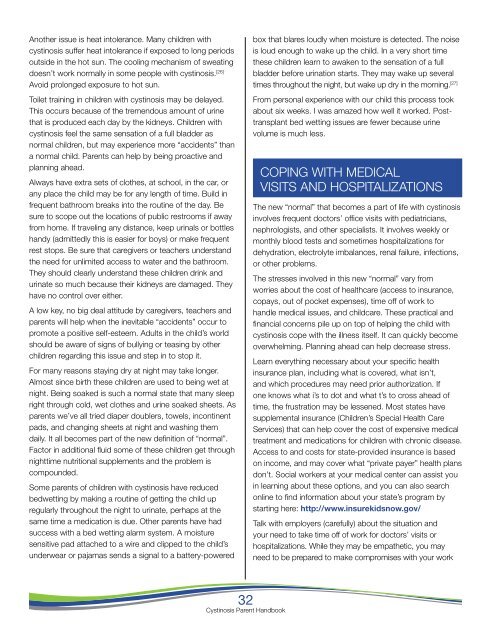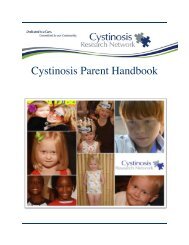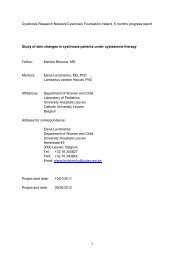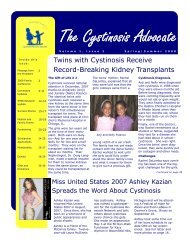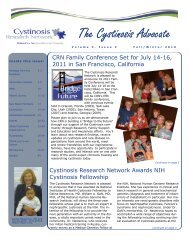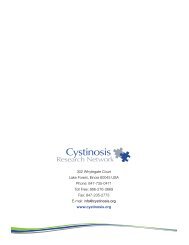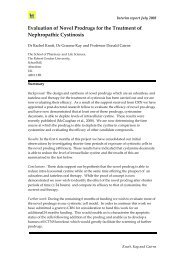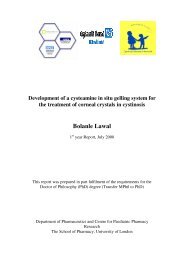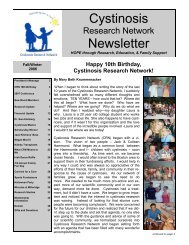Cystinosis Parent Handbook Final - Cystinosis Research Network
Cystinosis Parent Handbook Final - Cystinosis Research Network
Cystinosis Parent Handbook Final - Cystinosis Research Network
You also want an ePaper? Increase the reach of your titles
YUMPU automatically turns print PDFs into web optimized ePapers that Google loves.
Another issue is heat intolerance. Many children withcystinosis suffer heat intolerance if exposed to long periodsoutside in the hot sun. The cooling mechanism of sweatingdoesn’t work normally in some people with cystinosis. [26]Avoid prolonged exposure to hot sun.Toilet training in children with cystinosis may be delayed.This occurs because of the tremendous amount of urinethat is produced each day by the kidneys. Children withcystinosis feel the same sensation of a full bladder asnormal children, but may experience more “accidents” thana normal child. <strong>Parent</strong>s can help by being proactive andplanning ahead.Always have extra sets of clothes, at school, in the car, orany place the child may be for any length of time. Build infrequent bathroom breaks into the routine of the day. Besure to scope out the locations of public restrooms if awayfrom home. If traveling any distance, keep urinals or bottleshandy (admittedly this is easier for boys) or make frequentrest stops. Be sure that caregivers or teachers understandthe need for unlimited access to water and the bathroom.They should clearly understand these children drink andurinate so much because their kidneys are damaged. Theyhave no control over either.A low key, no big deal attitude by caregivers, teachers andparents will help when the inevitable “accidents” occur topromote a positive self-esteem. Adults in the child’s worldshould be aware of signs of bullying or teasing by otherchildren regarding this issue and step in to stop it.For many reasons staying dry at night may take longer.Almost since birth these children are used to being wet atnight. Being soaked is such a normal state that many sleepright through cold, wet clothes and urine soaked sheets. Asparents we’ve all tried diaper doublers, towels, incontinentpads, and changing sheets at night and washing themdaily. It all becomes part of the new definition of “normal”.Factor in additional fluid some of these children get throughnighttime nutritional supplements and the problem iscompounded.Some parents of children with cystinosis have reducedbedwetting by making a routine of getting the child upregularly throughout the night to urinate, perhaps at thesame time a medication is due. Other parents have hadsuccess with a bed wetting alarm system. A moisturesensitive pad attached to a wire and clipped to the child’sunderwear or pajamas sends a signal to a battery-poweredbox that blares loudly when moisture is detected. The noiseis loud enough to wake up the child. In a very short timethese children learn to awaken to the sensation of a fullbladder before urination starts. They may wake up severaltimes throughout the night, but wake up dry in the morning. [27]From personal experience with our child this process tookabout six weeks. I was amazed how well it worked. Posttransplantbed wetting issues are fewer because urinevolume is much less.Coping with medicalvisits and hospitalizationsThe new “normal” that becomes a part of life with cystinosisinvolves frequent doctors’ office visits with pediatricians,nephrologists, and other specialists. It involves weekly ormonthly blood tests and sometimes hospitalizations fordehydration, electrolyte imbalances, renal failure, infections,or other problems.The stresses involved in this new “normal” vary fromworries about the cost of healthcare (access to insurance,copays, out of pocket expenses), time off of work tohandle medical issues, and childcare. These practical andfinancial concerns pile up on top of helping the child withcystinosis cope with the illness itself. It can quickly becomeoverwhelming. Planning ahead can help decrease stress.Learn everything necessary about your specific healthinsurance plan, including what is covered, what isn’t,and which procedures may need prior authorization. Ifone knows what i’s to dot and what t’s to cross ahead oftime, the frustration may be lessened. Most states havesupplemental insurance (Children’s Special Health CareServices) that can help cover the cost of expensive medicaltreatment and medications for children with chronic disease.Access to and costs for state-provided insurance is basedon income, and may cover what “private payer” health plansdon’t. Social workers at your medical center can assist youin learning about these options, and you can also searchonline to find information about your state’s program bystarting here: http://www.insurekidsnow.gov/Talk with employers (carefully) about the situation andyour need to take time off of work for doctors’ visits orhospitalizations. While they may be empathetic, you mayneed to be prepared to make compromises with your work32<strong>Cystinosis</strong> <strong>Parent</strong> <strong>Handbook</strong>


